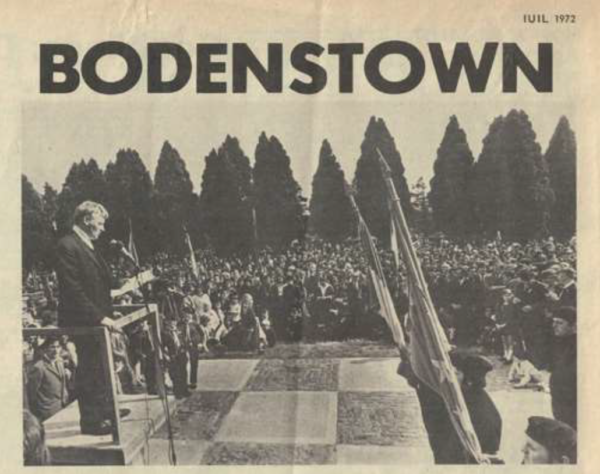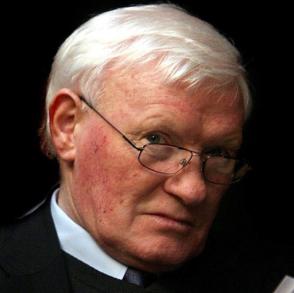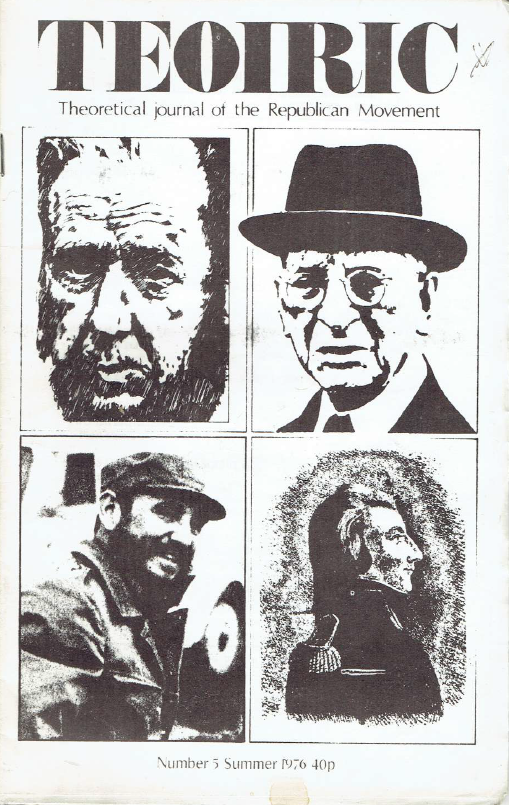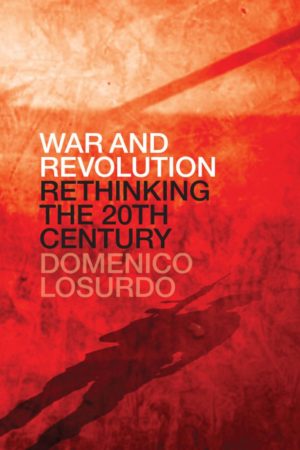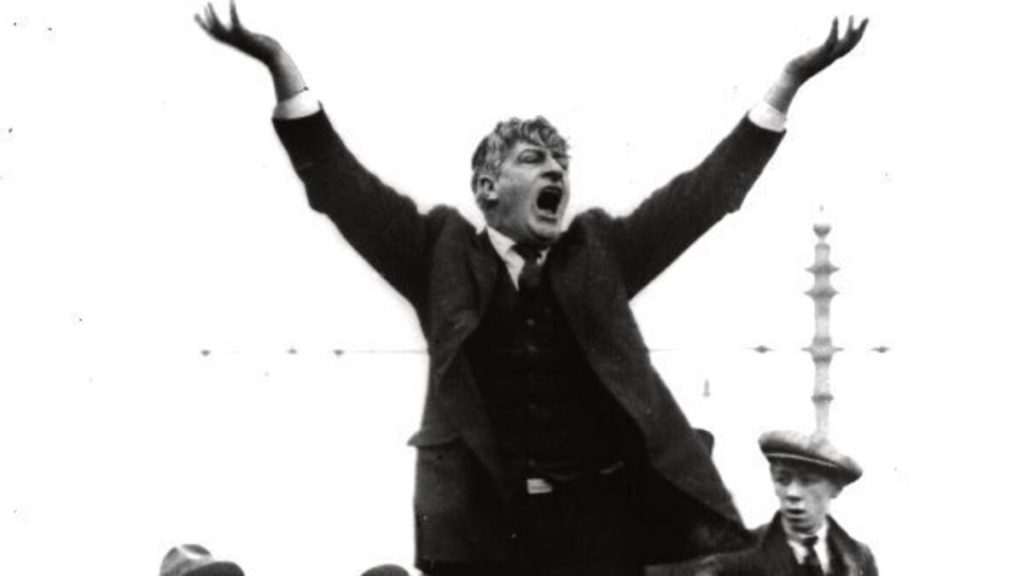Táimid tagaithe anseo arís go mBaile Buadáin mar is gnath dúinn chun ómós agus ónair a dhéanamh do chuimhe Theobald Wolfe Tone. Tá sé de dhualgas orainn an óráid seo a úsáid, ni h-amháin chun ómós a dhéanamh do ainm Toin, ach chun a aidhmeanna a scrudú agus féachaint cé comh fada agus atá said curtha i bhfeidhm in Éireann. An chéad ceist gur ceart dúinn a chur ná céard iad aidhmeanna Wolfe Tone? Gan freagra ar an ceist seo, nó gan tuiscint a fhealsúnacht, nílimid ag déanamh ach ceap magaidh den fear agus a chuid phroindabail ag teacht go dti an áit seo.
We have learned, we must learn, from the failures and the shortcomings of those who, bravely and defiantly, went before us. We have learned, and we must learn, from the mistakes made in our time. The Republican Movement recognises and repudiates the error of elitism, the doctrine which sets aside the wishes of the people with the expectation that where militants lead the people are bound to follow. We have seen the failure of this doctrine in our time, we have fully and consciously acknowledged it, we have determined to avoid this error and to move forward in concert with the people in new awareness of the people’s needs. Because these, as Connolly has said, are the only needs that must be served. We can, we must and we will respond to one imperative and to one imperative only – the will, the popular vision, of the mass of the Irish people.
If those who have preceded us have failed, and can we now deny that they failed, it was because, however courageous, however great, however self-sacrificing they were, the mass of the people of Ireland were not behind them. More accurately, because of limitations imposed on them by the forces of the enemy, because of the difficulties of communication and education, they were unable to respond to the people’s needs in all their manifestations, social, economic, political and cultural.
We, the Republican Movement, must see now and fully recognise and realise the danger of becoming once again separated from the mass of the people of Ireland, from their demands, their aspirations and their ultimate irresistible strength.
Alternative
We are aware of this danger and we are totally convinced that it must and it can be avoided. The alternative to elitism, the alternative to idealism without practical effect, the alternative to vainglorious failure in another lost cause, fit only for romantic balladeers, is to build a revolutionary party based on the reality of the principles of Tone and recognition of the condition of our country and our people. This is what we have proposed to do: this is the foundation that we have laid, this is the determination to ask every Irish man and woman who has the interests of our common humanity at heart to share. This is the fight that cannot be lost because in building a revolutionary party of the working people of Ireland we are responding to an indomitable force – a force which cannot and will not be defeated.
The function of the Republican Movement in building the revolutionary party of the Irish people must be stated clearly and fully recognised. Because we cast aside as undemocratic and false the notions of elitism, because we recognise in so much of the so-called parliamentary democratic system a barely camouflaged attempt at autocracy and oligarchy, because we will not use these essentially undemocratic means, we must immerse ourselves in the struggles of the people for full freedom in all its aspects. We must be involved in the struggle of trade unionists for their just and undeniable rights to better conditions and more equitable rewards until, ultimately, they and not the sharks of capitalism control their own industries. We must be in the van when the small farmer struggles against the rancher and the middlemen for survival, when the small shopkeeper feels the force of the multi-national supermarket gangsters. We must work with the housewife when she suffers the increases imposed by the plausibly presented profiteers, the distributors of food, clothes and the necessities of life. We must work with all women for equality in social conditions, work and rewards.
Organise
Wherever there is conflict between the interests of the masses and the interests of the ruling few, between capital and the value of human life, the Republican Movement must take its stand with the people to educate, agitate and organise so that the people may go forward, in dignity and consciousness to the final success – OWNERSHIP OF THEIR RESOURCES, CONTROL OF THEIR LIVES. We make no cult of personal leadership. We speak of leadership rather than leaders. For we realise that the leadership of the revolutionary movement is one of the most important problems that faces any revolution. Every aspect of the revolution is related to another and the central leadership has the task of uniting all the various aspects of the revolution into one mighty flood.
Our involvement now encompasses not only agitation for full civil rights in all of Ireland but affairs which might once have been considered beyond the scope of Republicanism. But we know that if we are to succeed in building a revolutionary party we must be involved in every area of struggle and not confined within the narrow limits which once constricted the movement’s development. We must be active in the country’s cultural affairs to express, through native art and literature, the aspirations of the Cois Muintir. We must point to the inadequacies of the social system to help those least able to help themselves. We must take up the cause for a country free from pollution of earth, air and water, for pollution, like most other evils that the people suffer is the direct product of the system which permits the few, sanctified by money (and money can sanctify anything) which permits the owner of property and the exploiter of the masses to impose still further on the working people by destroying the atmosphere in which they live and the inheritance of beauty which is theirs. The struggle is everywhere. In the schools, in the churches, in the factories, in the fields, in the shops, in the streets; wherever there is struggle, the revolutionary party of the Irish people must be at the heart and head of it.
Means
What means are we to use? First, we must identify the enemy, study his weapons and decide on the appropriate response. The enemy is the imperialist, the capitalist, the foreign gangster or his native lackey; the enemy is the bishop entertaining notions of hierarchical control and the minister hiding his Orangeism behind a clerical collar; the enemy is the man who helps a tottering oppressor by appeals to sectarian violence; he is the sniper of the ultra left whose sectional slogans or dogmatism are as meaningless as his interest is academic; the enemy is the social democrat, opportunist or intellectual, who pretends to socialism but, once scratched by reality, reveals his desire only for power. These are the enemies and of these we will have more to say. The question is: how are we to counter the threats, the distortion, how to fight the moneyed bully and the arrogant cleric in the interests of the Irish people? No bully, no amount of arrogance can defeat a people organised, educated and prepared in the revolutionary tradition. Put more simply, no group, however tightly knit and powerful, with whatever backing of the State’s forces of so-called law and order, can defeat a people conscious of its rights, determined in its demands and organised to meet the challenge of the oppressor. Let me repeat once more that organisation, education and agitation must, first and foremost, be the means that we employ to fight the people’s fight.
Terrorism is not a weapon that anyone genuinely concerned for the revolutionary organisation of the working-class will employ. If reacts against the interest of the people, dividing them on an artificial basis that has been carefully fostered by the forces of reaction. The tottering junta in Belfast is upheld, not destroyed by the use of terrorist tactics. Upheld because the mass of the people recoil in horror from the spectacle of innocent civilians, non-combatant population, made subject to force that should be reserved for those who impose the oppressor’s violence on the Irish people. The Republican Movement, in building the people’s revolutionary party, refuses to engage in terrorism that divides the working people of the country to the advantage of the corrupt few who are clinging to power. The Republican Movement does not wish to bomb one million Protestants into a united Ireland. The revolutionary party of the people recognises only the unity of the working-class and will not now engage in any campaign which could only have the effect of helping the miserable rulers of the working people to survive. We want not division, not fear, not domination of one corrupt gang of capitalists rather than another. This was not what Tone or Davitt or Connolly fought for; this is a hollow aspiration of the hollow men in Fianna Fáil. But let no one take from this gathering and from this repudiation of terrorism any suggestion or even any hint that the army of the people will not be used and, when necessary, fully employed to defend the interests of the working people. We make this condition: that all other means have failed before such action is taken and that the people are threatened with the mercenary force of the agents of capitalism. The Republican Movement has no desire for violence, no preoccupation with bomb and bullet. And let it be understood that the Republican Movement derives no pleasure from illegality, no comfort from being presented as an underground force secretly plotting the overthrow of the State.
The illegality has been imposed on the Republican Movement not by it. The use of bomb and bullet has been imposed, with the prison cell and the internment cage, by the agents of imperialism and the force of law. Law made by those who act in the interests of capital. Law imposed with violence upon the people. Law designed to maintain, to propagate and to legitimise the system of the boss class, native and international. No movement of the people, no revolutionary party, has the right to demand of the people that they should set aside the weapon that is so viciously used by the gangsters who act in the name of this law and in the name of the continuing capitalist order. We will not do it.
Defeats
We have, we mut face the fact, suffered defeats during the past year. We alone, with our comrades, the genuine representatives of the labour movement, not the social democratic opportunists and the haughty intellectuals, we, with these comrades, fought the fight against membership of the Common Market. We were defeated in the battle but the war is not lost. While the social democrats of the Labour Party, in which there were some honourable socialist exceptions, sat idly by – some as far from the campaign as they could possibly get – we struggled against the combined forces of Fianna Fáil and Fine Gael, the combined opposition of press, radio and television, the threats of businessmen and the power of the ranchers. It is remarkable that given this powerful and massive opposition, we succeeded in winning 211,000 votes against the sell-out. It is even more remarkable that the lack of objectivity of inspired commentators afterwards led them to proclaim that each of these 211,000 votes was a vote in favour of the line so opportunistically adopted by the leadership of the social democratic Labour Party. What liar, what dreamer, can now advance the opinion that Labour was genuinely opposed to the E.E.C.? Labour, the parliamentary party which has since gone so far to prove its antidemocratic
respectability that it has offered to prostitute the workers’ movement in coalition with the most reactionary supporters of E. E. C. membership. Labour, the parliamentary party which, with a few honourable socialist exceptions supported Lynch and O’Malley in the introduction of the Prisons Bill. Labour, once more the official traitors to the class they pretend to represent, the parliamentary party that stood behind the introduction of the Special Criminal Courts to try Republicans under the monstrous Offences Against the State Act. The revolutionary party of the Irish extends goodwill and support to those genuine representatives of the working-class who are now struggling inside the social democratic structures of the Labour Party and invites them to form the only possible alliance of the left, with the Republican Movement. Let the social democratic right, like pigeons, find their home with the hawks of ultra conservatism. Let the left unite to fight and win the war.
Internationalism
We have been accused of adopting an alien ideology. The whisper campaign is mounting to a shout as its opponents see that the Republican Movement is gaining strength. Let them shout. Let them look for reds under the beds. Let them look wherever they will. Let them ferret out alien influences, for what they will find is the doctrine of Tone, the father of the Republicanism the Lynches and the Haugheys and the O’Malleys pretend to espouse and honour. They will find the inspiration of the French Revolution in all that Tone wrote. They will find in his manifesto a declaration of solidarity with the French Jacobin Movement. Let them look to Connolly, whose memory they dishonour by their pretence at celebration. Connolly quoted with approval Tone’s humanitarian declaration and added his own pledge of loyalty to the international working class.
If this is alien influence, let us acknowledge it with pride. It is the influence and inspiration of the revolutionary party of the Irish people. We choose from the past, from the doctrine of each struggling generation, that which is appropriate to our time. We weld if to the experience of the working people today. We make no apology to anyone who is disturbed by this recognition of reality and the historic role of the Irish Republican Movement. The man who calls us alien either knows no history or would prefer us to forget it. He knows nothing of our tradition or, like Hillery, is intent upon betraying it. If it is alien to recognise the common humanity of working people struggling for freedom everywhere in the world, then call us alien and be damned. For the revolutionary party of the Irish people shares with the struggling people of Vietnam, Palestine and South Africa, with black Rhodesia and the colonially dominated people of South America and of all those elsewhere in the world, rich and deep resentment and the still more powerful will to resist the oppression of imperialists and the betrayal of native capitalists.
The Republican Movement shares with every person of goodwill in this country full-blooded determination to expose and resist oppression in Ireland, whether the internment camp or prison, the court or the Ministerial order be North or South and whether the prisoner by Loyalist or Provisional, Saor Éire or pacifist. The Republican Movement recognises the universal nature of oppression and the common cause of resistance. And we say that, where oppression exists, it is in all cases a reflection of the failure of the oppressor to meet the legitimate demands of the people. If Lynch or Faulkner or Heath or Wilson, or any of their predecessors had had the desire to tackle the social, political and economic roots of the problems of the Irish people, this country would be at peace today. It is their failure which has produced the need for the civil rights movement and their fear of the success of the civil rights movement which imposed physical violence on the people. Colley told the I.R.A. to get out of the way and let him and his colleagues solve the problems of Ireland. There have been fifty years during which the Colleys of this country had their chance to solve the people’s problems. They did precisely nothing. It is time that they should get out of the way and let the people themselves solve the problem.
Our demands
The Republican Movement opposed the abolition of Stormont, not because it was the structure of the Orange Junta but because we follow the doctrine of Wolfe Tone; our demand is not integration but separation. In abolishing Stormont, the Tory Government showed the Loyalist people of the Six Counties how much they valued their loyalty. The Republican Movement, which has among its members Protestants, Catholics and men and women of no religious affiliation, now, even at this late stage urges people of all religions to look closely at what we say and recollect what we have done. Of course, there have been mistakes. We have admitted them and worked to set right what was in error. We say now to the Loyalist people of the Six Counties: together, we can solve our people’s problems, the problems of the working people: divided and opposed, we can benefit only the rulers who have gained from our division in the past.
Our demands remain: the abolition of the Special Powers Act; the ending of internment; an amnesty for all political prisoners and for all those forced to leave their homes through their activities in the peoples struggle; a cessation of search and arrest operations and harassment of the working people; there must be freedom of political expression for all; cancellation of all debts arising from rents and rates strike; a Bill of Rights which would provide guarantees that the Six Counties might rise from the morass of neo-fascism to the minimum level of a democratic state. We demand that the British troops be removed to their barracks as a preliminary to their removal from the country completely.
Only a people united behind a leadership of principled men and women can secure these demands. The Republican Clubs have the leadership and they have begun to organise the people in political action. They will press ahead in this field and will demonstrate to all by their involvement with the working people that the alternative to the corrupt sectarian Unionist and Nationalist is the policy of the Republican Movement. No group of social democratic politicians or sectarian militarists has the right now, or at any time, to betray the people or to even attempt to talk to the British until the demands made by the people are met.
For Republicans these are but minimum demands. To admit and give them effect would be no more than to shift the six-county state from abnormality and repression to some kind of normality. The working people of the six counties of whatever religion, have these rights. They have been taken from them. To restore to the people these rights is not to confer any great benefit on them. After they have been restored the Republican Movement will continue to agitate, educate and organise in support of a full revolutionary programme which would radically change not lust the form but the nature of the society leading towards a democratic socialist republic of 32 counties of all Ireland.
26 Counties
In the 26 Counties, the revolutionary party of the people will continue to struggle for the rights of men and women to work, to house their families and feed their children, to enjoy education free from the control of clergy of any denomination and class discrimination of any kind; we will fight for the rights of all the people to control all the resources of this country which is theirs; we will fight the mine operator who grows fat on profits which belong to the Irish people and we will fight the political gombeen man who, for a few pounds and a seat in a Mercedes, is prepared to sell his people out.
As we stand here, remembering a man who died in prison, let us remember all those who are still where Tone died – in the imperialist’s cell, Belfast, Mountjoy, Portlaoise or in England. We proclaim our solidarity for the men and women who are on hunger-strike, slow starvation because they believed that preferable to submission to a system that would slowly starve not only them but the children of the next generation. Let us remember those who, like Tone, have died this past year because they were determined to fight now, once and for all, for the full emancipation of the people of Ireland. We remember in particular those of our movement, Martin O’Leary, Rosina Curry, Gerard O’Hare, Gerard Doherty and Joe McCann. Let us remember those who are, as republicans have so often been before, shackled in the internment camps – the Curragh as well as Long Kesh – of their masters.
Because we have come here to remember Tone, because we now remember those of our people who have died during the past year, because we send out from here our feelings of solidarity with those who are still suffering in the common name of Republicanism, we must also pledge ourselves here at Bodenstown, to work in factory, church, school and street, for the Revolution which has cost us so much and which can now, in our generation, finally and triumphantly succeed. You have heard the programme of the Republican Movement, the revolutionary party of the Irish people. On behalf of the revolutionary movement, I say – using the words of Tone: “We have gone to what we conceive to be the root of the evil; we have stated what we conceive to be the remedy -with society thus reformed everything is easy; without it, nothing can be done.
Aidhm Tone
Éistigí leis an smaoineamh bunúsach a bhí ag Toin agus na n-Éireannaigh Aontaithe – an ceangal le Sasana a bhriseadh agus gach rud a leanann é – Poblacht neamhspleách a bhunú agus náisiún láidir in a mbeadh saol gan bochtanas agus gan dishaothrú an lucht oibre ann. Caithfaimid-ne a thuigsint ceard é a bhí in aigne Toin i dtaobh náisiún. Séard a bhí mar aidhm aige na aontas Protustúnach agus Caitliceach mar thuig sé go raibh sé do-dhéanta a chuspóirí a bhaint amach gan an aontas seo. Ní gá ach breathnú thuaidh agus theas in Éirinn inniu le feiscint nach bhfuil neamhspleáchas ann, nach bhfuil deireadh le dishaothrú mór chuid na ndaoine, go bhfuil an cultúir beagnach curtha ar neamhniú.
De réir a chéile tá cineal saoil na tíre dá mhilleadh ag na gambin-polaiteoirí, rud narbh féidir leis na Sasanaigh a dhéana. D’éirigh leo sárphrionsabail Toin a claonadh ach in ainneoin sin bhíonn beagán daoine i ngach glún a bhíonn reidh fealsúnach Toin a glacadh agus a mhúineadh arís. Ó aimsir Toin anuas tá sé le feisint go raibh fir agus mná sásta fulaingt agu fiu bás d’fháil chun an fealsúnacht sin a chur chun chinn.
Mar shampla, dá mbeadh saoirse eacnamaíochta againn gan saoirse cultúir ní bhfead tada bainte amach againn agus ar an laimh eile ní bheadh aon maitheas sa cultúir gan arán dos na daoine. Seasann eagraíocht reabhlóideach na h-Éireann le saoradh iomlán na ndaoine agus de bharr sin tá sé d’fiacha ar gach ball den eagraíocht ceanngail a bheith air chun go mbeidh toradh gasta ar ár gcuspóirí. Ní mór dúinn bheith páirteach i ngach gné den saol, ag gach leibhéal den saol. Tá obair le déanamh insna ceard cumainn, na h-eagraíochtaí tiononta, agus na h-eagraíochtaí cultúrthu san nGaeltacht is sa nGalltacht. Ní leor go dtugaimid tacaíocht amháin dóibh suid, ach tá dualgas orainn bheith páirteach ionnta go h-éifeachtach chun go bhfeadfaimis in an an fealsúnacht reabhloideach a chur i bhfeidhm. Tá ár gcuspóirí i gceart againn ach chun go mbeidh an bua againn caithfimid an oiliuint, an gríosú, agus an eagru a dhéanamh i measc na ndaoine.
Seán Garland (7 March 1934 – 13 December 2018) was the General Secretary and President of the Workers’ Party at various times between 1977 and 1999. In the 1960s, Garland became a Marxist and was one of a generation of IRA leaders who attempted to lead the organisation away from violence and into left-wing political agitation. He worked closely in this with figures such as Cathal Goulding and Tomás MacGiolla. During the 1969/70 IRA split, Garland supported the moves to abandon abstentionism and was a key figure in Official Sinn Féin (as national organiser) and Official Irish Republican Army (as Adjutant-General).
